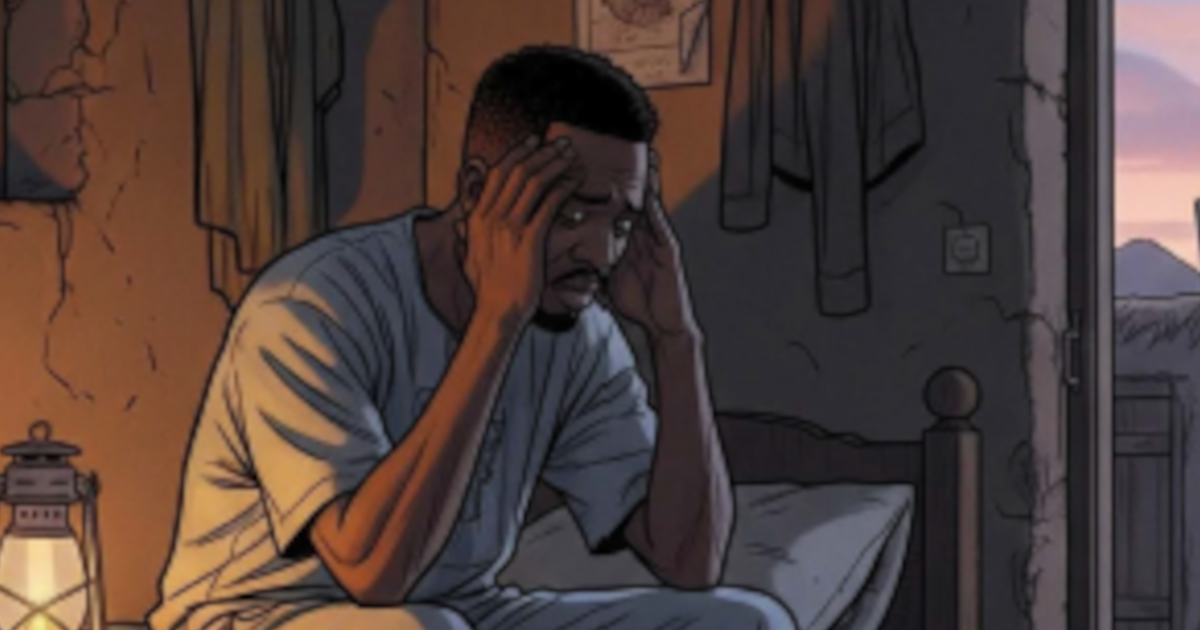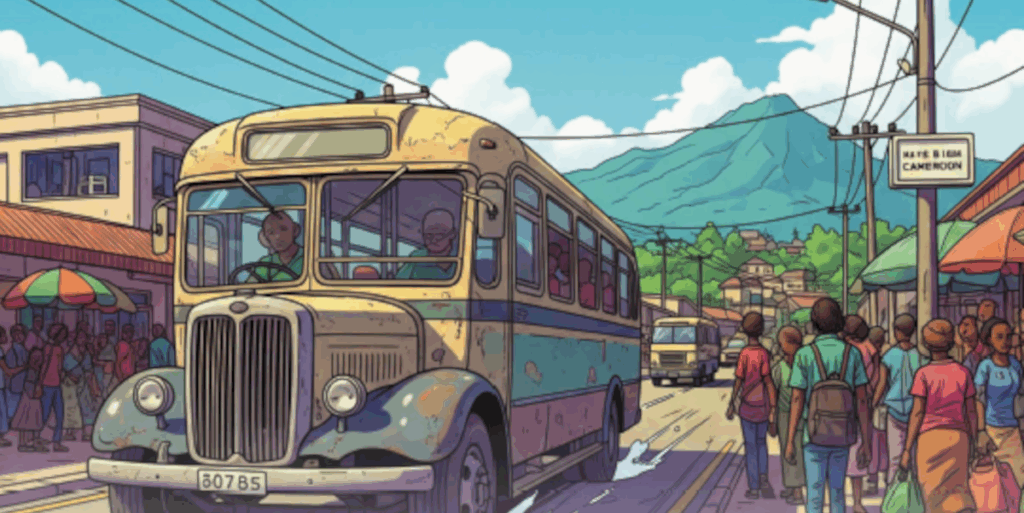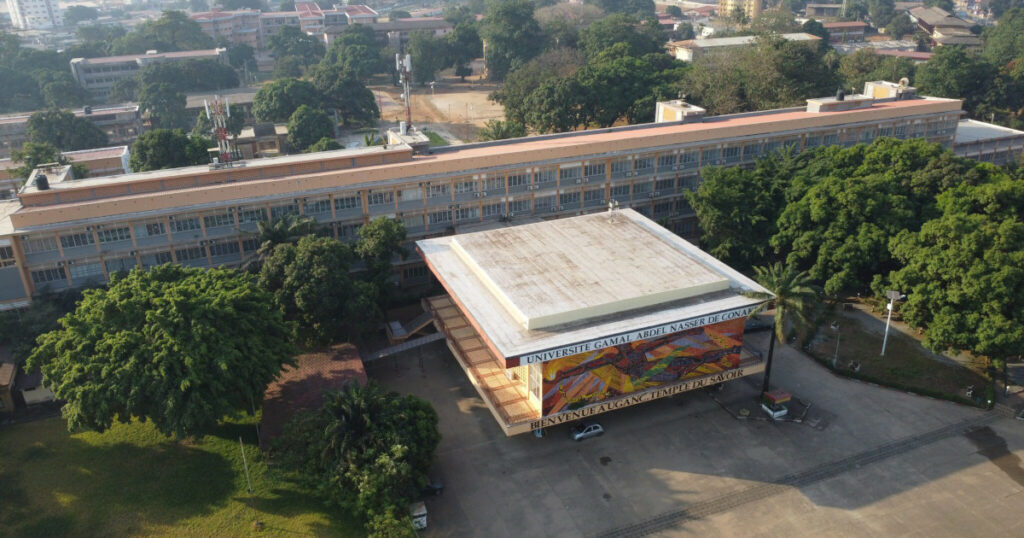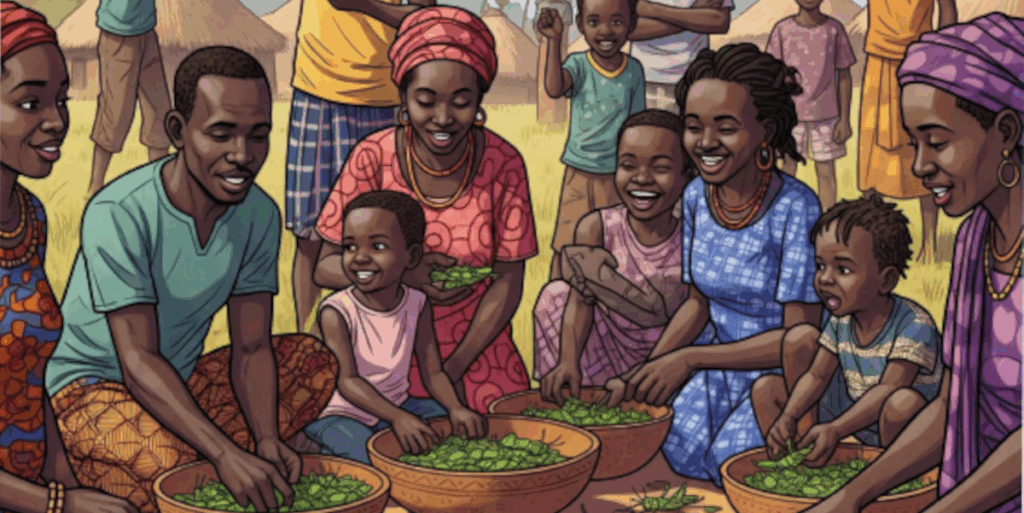A distressed farmer is at the heart of the fourth short story from the future of the Congo Basin
Manaouda woke up that day from a fitful sleep that had not allowed him to close his eyes, reduced to thinking about the strategies he had to cook to earn the next day’s pittance. On top of that, there were other tasks, each no less important than the other: looking after his children, feeding his family, fulfilling his responsibilities. Coming from a middle-class family of which he was the eldest. he had been forced to leave school in order to assert his birthright. at the risk of losing it to a richer brother. Manaouda had a lot to do with brothers and sisters to look after. He had to do everything. That’s the way things are in Africa. So, he diversified his sources of income. He mainlyraised livestock, worked the land in the rainy season and got by with the mototaxi (motorbike used as a taxi) in the late hours when he had to offer himself to the gods of sleep. He had no rest. But he still managed. Manaouda answered all the family’s calls. He honoured his responsibilities. But at what price? In any case, it didn’t matter whoever was the man we now called Dad.
Welcoming the dawn with legs as stretched as they were transformed was one of the few experiences he had had. But he tried to get up, in response to a bell he had just heard thundering, probably from a church nearby. Prayers now abounded at dawn for reasons known to the townsfolk. The loud speakers were opening their throats in the high places of the city’s many mosques. They couldn’t take it anymore. Only the invocation of the Most High could deliver them from these misfortunes and get them out of this dark night.
Many families were practising news-phobia, because nothing enchanting was being said on television any more. While TV used to entertain with films and light-hearted programmes, or provide information about opportunities, this time it had become an instrument of psychological torture. Manaouda still glanced at it when the power came on sporadically. When the news wasn’t revolving around a suicide, the murder of a mother by her child or the imprisonment of a citizen, it was hovering around an embezzlement of public funds that few newspapers would mention. They also echoed a wave of deaths whose origins lay in the food crisis, the heat, the wars over resources; and the scale of these wars had nothing to borrow from the Rwandan genocide to instil fear.
Manaouda, stunned, wondered if what was happening to his cotton legs was a consequence of these contingencies. Was he too nearing the end? He thought as much about the many tasks he was carrying out because of the constraints of time, and because of old age, which he was far from being a militant for. Suddenly, his daughter Madjole entered after having impressed the door with a few light flicks of her wrist. She sat down on the mat once she had let herself in, pallidly handling, in turn, the ants in agreement with funeral eulogies. Some of them were obviously waiting, sticking out their antennae in search of the measly food. Others were whining about the abyss that was gripping the world more than humans cared. As much as ants perished, humans died. The heat had reached its peak. Wartime!
As usual, Manaouda and her daughter reviewed the family’s overall situation. But there were no major worries on the horizon, apart from the bad weather they were experiencing, which they had learnt to make part of their routine. And so, there was nothing to report apart from the wish to be able to adapt. Manaouda had fulfilled all his duties. But then, the sadness that seemed to have invaded his daughter’s throat caught his attention. He couldn’t resist wanting to know more. With her hands under her chin, she said, turning her head to translate what her father, sitting on the huge sofa drenched in the morning sweat, with the footstool between his legs, could not imagine: that she had just failed the police competitive exam.
Manaouda was so overwhelmed by despair, doubt and disappointment that he was left stunned, coitus and taciturn. He had hoped that this time the hook would catch the fish. He believed that life was going to put the smile powder in the family’s mouth after years of efforts regularly snatched away. He still had to try and try until he was disgusted.
He wrapped his palms around his face to disguise his anxiety about a daughter in need of consolation. A father’s duty. His head then dipped, revealing pathologies of desolation. He was overwhelmed with grief, not because she had failed, but because they had mobilised the few resources they had. He did everything he could to hold his anger in his heart. But this was attempting to ignore the damaging power of accumulated frustration.
It is like a bomb that cannot be deactivated and ends up claiming many victims, of which the war in Eastern Congo is the archetype. He expressed his regret and ended up whispering deep inside himself.
This sentence on his face did not escape the vigilance of his daughter, whose scattered gaze was about to strike at the same time the photos of her mother on the whitewashed wall and the environmental protection signs above the television set. His round eyes, soaked by a pool of tears, turned towards a traditional sewing machine, resting next to a pot of an old flower. But his reaction caught her daughter’s attention as she lifted her head, shaking away the trickles of tears that filled her thin, sad child’s face.
No sooner had he finished invoking the Holy Trinity to come to his aid in the face of these uncertain futures, than his wife called out to him from the door in a voice that could split a metal sheet like a thunderbolt. In her hands she held the basin, stained with a profusion of colours, from which drops of red millet porridge for the goats were oozing out at regular intervals. She paid no attention to the gloomy atmosphere that had taken over the whole sky in the living room, staring at a newspaper on the table, the source of which she didn’t know, but on which she could read:
“Floods in Mayo-Danay claim 11 lives, 198,378 victims, 103,000 houses destroyed, 185 primary schools and 13 secondary schools flooded.“
“40 children killed by suicide bomber in the Far North.“
“France to help the Cameroonian State.“
Sadness was the marker of the times. Happy were those who did not seek to know more. Woe betides the curious. All you had to do was open a piece of paper torn by the hurricane’s teeth to be confronted with bad news. But this newspaper was not his wife’s business. Her business was selling her doughnuts. Farming. Helping her husband. Looking after her family. So, she stuck her head inside and said to her husband:
“My husband! Can you come over? There’s something at the entrance. I don’t know what has happened. It’s just witchcraft.“
He didn’t have time to finish as he immediately went outside to follow in his wife’s footsteps, brushing aside the traditional greetings from the neighbourhood that came from left to right. He crossed the gutters as if they didn’t exist, invaded by piles of rubbish and scattered plastics. Eventually he took the corridor that would lead him to his farm as quickly as possible. There was nothing to be seen in the street, which, now more than ever, was devoid of passers-by. For lack of rain, the mandawa (groundnut) sellers who embroidered the alleyway with their wares had been dismissed. The soya ministries had come to a standstill. There were no more animals to turn the wheels of the ministry. Cattle were perishing and the surviving dogs had plenty to eat. The few mototaxi (motorcycle) riders were calling in vain to customers who were leaving in different directions, feeling their way along the rain-slicked ground. The trays carried by the hawkers were empty of items. Inside the balaclavas and hijabs, the locals ruminated, undressed and talked alone about inaudible subjects like mad people.
In single file, they continued walking, their faces fragrant with anxiety. A wave of the ochre odour of slaughtered animals and dead bodies in puddles, the exact source of which he didn’t know, swept down his nostrils, making him want to spit. He rushed to find out what it was all about. Taking the corridor that led them to the farm, he tried to dispel the uncertainties that strangled him at the thought of losing the rest of his riches, at the sight of chains of robberies pouring in. Lord, I hope what I’m thinking about isn’t reality! Manouda said to himself with a heavy heart.
When he arrived, he was surprised by a sad welcome to which he was never accustomed. His goats did not greet him. At that moment. his footsteps were fuelled by curiosity. He hurried over and saw the putrefactive state of the rest of his farm. He hurriedly opened the wire fence that served as an enclosure and swept his gaze over the whole dormitory, from the sheep’s compartment to that of the goats and passing by the cattle.
He had skilfully invested in and organised his farm with unmatched tact. After graduating from the Ecole Normale Superieure (Higher Teacher Training College), with nowhere to turn, he set about setting up a livestock project. He raised the money to make it happen.
Manaouda went round the whole farm, looking sadly and in turns at the sheep in agony. Some were in the eternal arms of sleep, wrapped in colourful shrouds. Some were chewing on the previous day’s food to the rhythm of the mourning of their companions spread out along the four corridors. He then went to the goat compartment. where two survivors were spraying saliva on the goats that had lost their lives. In the cattle compartment. there were no survivors. A head was trying as best it could to gather the remnants of life scattered between its legs. His wife, whose eyes were completely soaked, was staring at him, holding her heart in her hand in case there was a scandal. She followed him and helped him collect the hard-earned corpses.
“What are we going to do with them?” she asked in a faraway voice.
Question to the absent subscriber. He had nothing to do with questions like that. He had to mourn. In his mind, several images crept in and ideas were created. Sometimes his memory, now plastic iron, would tell him: You have to be able to overcome life’s challenges. You have to be stoic in spite of the dramas and circumstances. At other times, he could feel it echoing in the depths of his heart: life is pointless. You have to know how to let go. Leave things before they leave you.
Stoic about what? It’s an illusion. It’s for philosophers and writers who see the Congo Basin, for example, shattered into bits of mist, but continue to make a marvellous portrait of it all the same.
It occurred to him to call in a vet to identify the source of the problem. This could not happen without investigations being carried out. A member of staff arrived in his dark white coat. He moved from one compartment to another, feeling each animal’s genitals and squealing every time he lifted its head. Mr Aminou, chief veterinary officer at the Louggeo Centre, let all the questions Manaouda asked him pile up. This raised even more doubts. Mr Aminou was not Jesus to give back life to the dead. When he had finished inspecting the whole place, he took off his mask to give Manaouda the results of the autopsy.
“Sir, we’ve been all over the farm and I’ve seen what you’ve seen. It’s alarming and ultimately demotivating. But you can lose everything in the blink of an eye. In fact, all these animals died from suffocation. They ate inappropriate food because, as you know, just like humans, animals have to eat healthy. So, the food you gave them yesterday was poisoned. What’s more, they weren’t drinking enough water.“
But Manaouda had built a personal well in his homestead to solve the water problem affecting his entire neighbourhood. The river shared by the people had dried up completely, and the trickle of men draining into it could only end with the intervention of the forces of law and order to bludgeon those who were using force to gain access to the precious liquid. He dug his water reserve solely for his livestock farming activity. But he was too naive to think that he wouldn’t end up suffering the same general reprisals to which the whole town was subjected. Water was becoming scarce and it was necessary to be sparing to ensure the next day.
“Lord! I don’t understand a thing. It’s the same food they’ve always eaten without anything happening to them. And we’ve always made sure in the family that everything is clean, right down to the plates they eat from. We used to be able to give them water three times a day. But with the water crisis we’re in today, to the point where people don’t know where to get their water, we have to admit that it was difficult to continue with the same logic.“
Acknowledging his vulnerability and the pain Manaouda was going through, Mr Aminou, the vet, went out of his way to comfort him by giving him a course in personal development.
“You know that not everything works out the way you want it to. Everything has its opposite. You live today, you die tomorrow. It’s a bit like that. The important thing to remember is that it is highly likely that they ate the cowpea leaves that had been sprayed 30 minutes before they were cut and sold on the market. Whereas it is advisable to touch them only after a whole day. After eating them, all these animals were affected at the level of the intestines, which did not delay immediately to rot.“
Manaouda stuck a finger in his mouth to stifle the breath of desolation and disappointment that was forcing itself to escape. Beside him, his wife was trying to hold him back by inviting
him to pray. It’s God who does everything. If He is able to take humans back through death, it is the same for the animals that humans have always considered as prey.
“If we had been informed in time, we would have managed, even with difficulty, to recover some of them. Insecticide is very dangerous. It destroys the grass and makes the soil infertile. It kills slowly. That’s what farmers are using more of these days. All our land is now castrated and agricultural produce infected. We also have to be careful with fertilisers, which give a false illusion of production.“
No sooner had they finished inspecting the premises than the shrill hum of a machine fell silent at the entrance to the farm. The wrinkles on Manaouda’s surprised face showed his uncertainty. He wouId never have imagined or accepted being told to believe that such an individual wouId turn up at his homestead on such an obsequious day. Beyond his waistline, which overhung the branches of the neem (Azadirachta indica) tree bordering the limits of his homestead, a man lightly clad in a waistcoat of a finished orange hue, followed by a slender young girl, both entered, wearing white helmets. But he immediately recognised their identities and waved to his wife, pointing disdainfully in the direction they had just come. It certainly wasn’t the first time, nor would it be the last. You could see it in the confidence of their footsteps and the easy-going atmosphere of their conversation. Facing them minutes later, the strangers did not delay to introduce the quintessence of their surprise visit. The man took a notebook out of his bag, wrote down the date and delivered the contents.
“Hello. I’m Ahmadou, the local tax collector for the municipality. This is my colleague Mefo. Our visit falls within the legal framework of policies defined by Cameroonian law. Anyone who carries out an activity has a duty to contribute to taxation for the development of our beloved Republic. I’m sorry for the damage we’re seeing, but this is not the responsibility of the State.“
Distraught. Manaouda couldn’t say a word, reduced to mulling over his confused and scattered thoughts. The veterinary officer, still present at the crime scene, lent him a helping hand by explaining to the tax officers what had happened and the economic blow that the gentleman had taken in the face. The anger in Manaouda’s eyes and the embarrassment coming out of his eye sockets had so contaminated his mood that he almost attacked the tax officer who wasn’t sharing his grief.
What about him? The tax officer was there to do his job and he was accountable to his superiors.
So, the tax officer retorted: “I came here just to do my job. The rest is none of my business. And I don’t have all day for that. If you don’t move quickly, I’ll be forced to take your details and you’ll have to answer for your actions in court.“
His colleague continued to scribble lines in the notebook she held in her hand without saying a word. She discreetly filled in the columns at a steady pace and plunged her head back into her bureaucratic paperwork after glancing at Manaouda like a doctor. Mefo contracted the tissues of her nostrils to deflect the aromas coming from the farm. In a harsh tone, stripped of all complacency, she said: “We’ve come to collect the State’s share. We have nothing to do with the context. If everyone brings up the context, their marital situation, their family situation or things like that, what will the State live on?“
Manaouda was overwhelmed by the loss of his livestock and harassed by State agents who did not care to sympathise with him. How am I going to feed my children? he asked himself. Suddenly, Madjole entered the farmhouse and slipped a piece of paper between his father’s cold palms, whispering words he couldn’t understand. He couldn’t resist reading it. All the world had united against this famous character. He stared at a power cut notice. The now sad entrepreneur hadn’t paid his bill for the month and the State had to claim back its investment, even though Manaouda had been enjoying the glow of the moon for days. When the electricity went off at sunrise, you had to wait until midnight to see its silhouette in the darkness of the night. The Lagdo dam had dried up and was unable to cope with all the growing demands.
One morning, to the surprised discovery of his wife, Manaouda left under the impact of the fatal outcome, causing violent whirlwinds that shook Pitoa for a fortnight. He died of a heart attack.
Lapeube Palou Absolo
This text has been written after two participatory foresight workshops on #CongoBasinFutures and #RoyalAnimalsFutures in Yaoundé, Cameroon, on Saturday 7 September 2024. It has been edited by Nsah Mala and published by Next Generation Foresight Practitionners.




